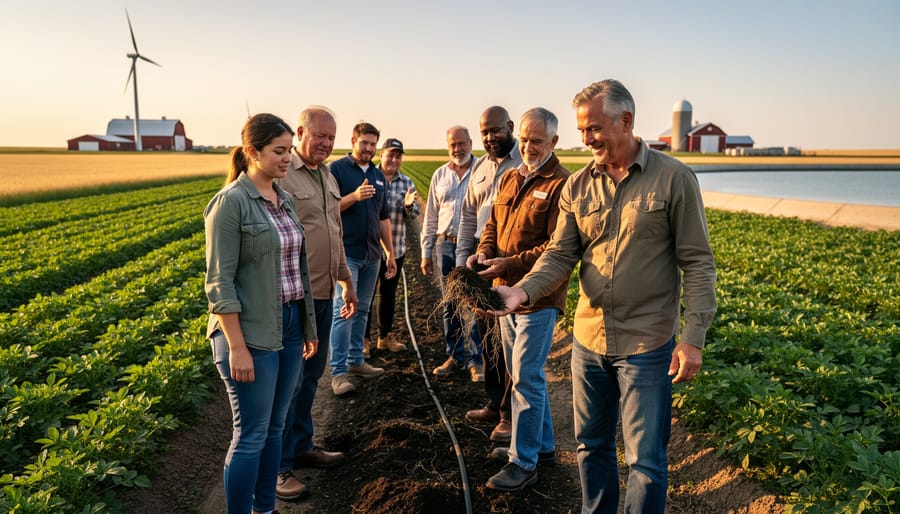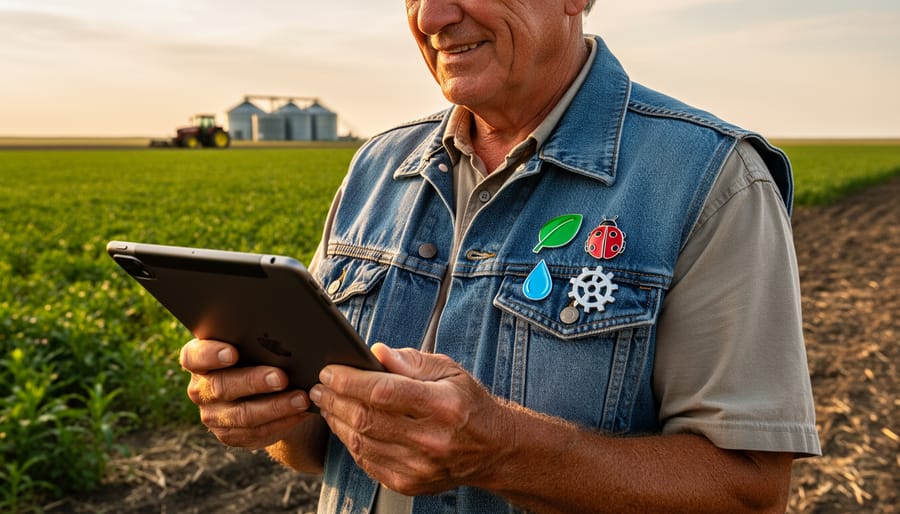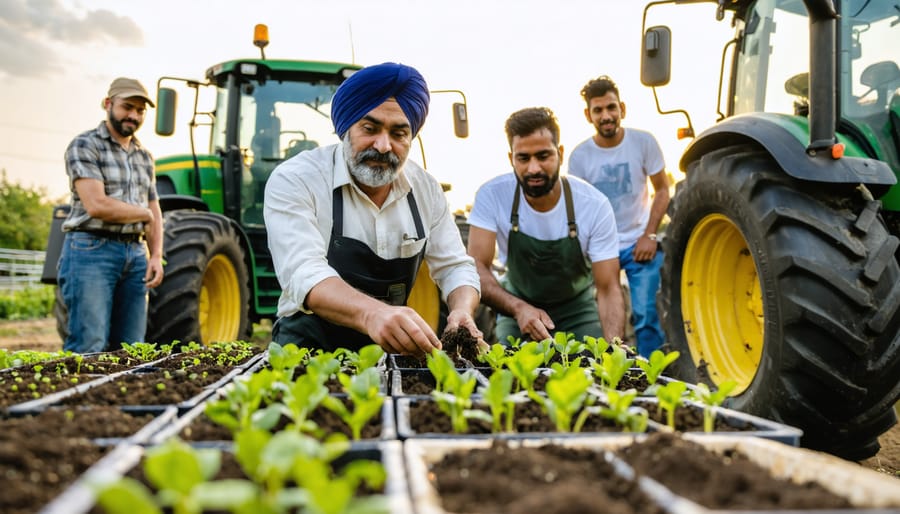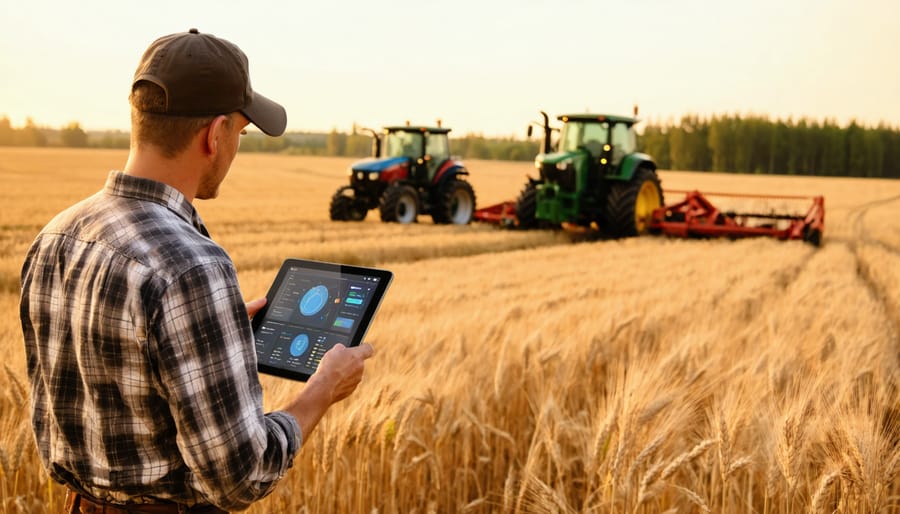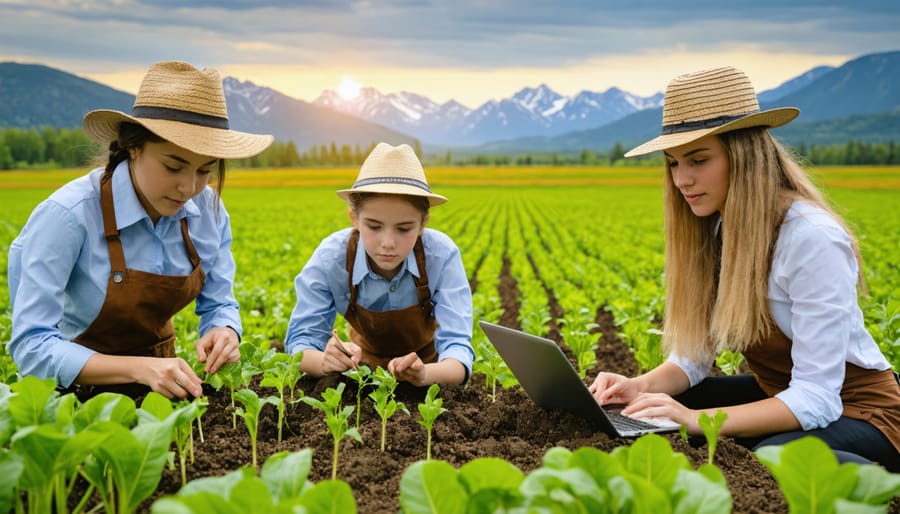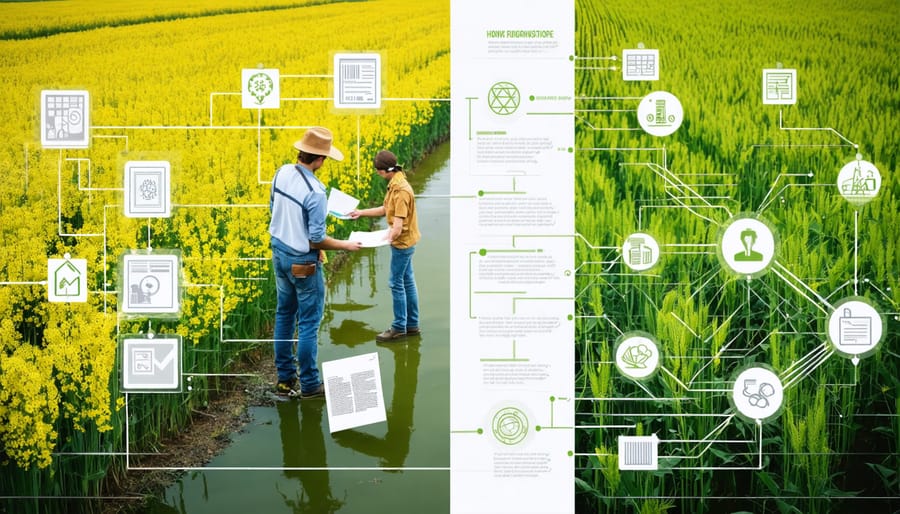In the heart of Alberta’s agricultural landscape, a quiet revolution is transforming the lives of farmers through innovative empowerment initiatives. From small-scale family operations to large commercial farms, producers are breaking free from traditional constraints by embracing new technologies, sustainable practices, and collaborative learning models. This transformation goes beyond mere technological adoption – it represents a fundamental shift in how farmers approach their role as stewards of the land and drivers of rural economic growth.
Recent data shows that empowered farmers experience up to 40% higher crop yields and maintain more resilient operations during market fluctuations. Through access to digital tools, financial literacy programs, and sustainable farming techniques, Alberta’s agricultural community is building a more secure and prosperous future. Community-led initiatives, coupled with government support programs, are creating a robust ecosystem where knowledge sharing and practical skills development take center stage.
As climate challenges and market demands evolve, farmer empowerment has become not just beneficial but essential for the future of Canadian agriculture. This strengthening of our agricultural foundation ensures food security, environmental sustainability, and the preservation of rural communities for generations to come.
Modern Agricultural Education: The Foundation of Farm Success
Digital Learning Platforms and Resources
Today’s farmers have unprecedented access to digital learning resources that enhance their agricultural knowledge and operations. Modern digital agronomy tools and online platforms offer flexible, self-paced learning opportunities tailored to Canadian farming conditions.
The Alberta Farm Management Online Learning Hub provides free courses on crop management, livestock care, and business planning. Farmers can access video tutorials, interactive modules, and downloadable resources at their convenience, particularly useful during off-season periods.
Popular platforms like AgriStudies and FarmSmart connect producers with agricultural experts through webinars and virtual workshops. These resources often feature real-time weather data integration, soil analysis tools, and crop planning calculators specific to different regions across Alberta.
Mobile apps have become essential learning tools, with options like the Canadian Crop Manager and Weather Farm providing instant access to critical information. Many of these platforms also facilitate peer-to-peer learning through discussion forums and virtual meetups, allowing farmers to share experiences and solutions with colleagues across the country.
Local agricultural associations regularly update their online resource libraries with region-specific content, ensuring farmers have access to the most relevant and current information for their operations.
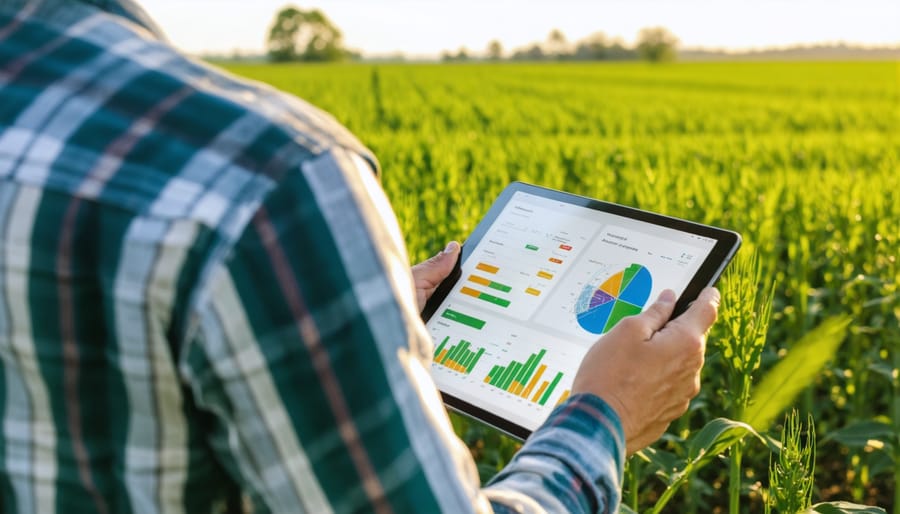
Hands-on Training Programs in Alberta
Alberta’s agricultural community benefits from a robust network of hands-on training programs designed to enhance farming skills and knowledge. The Olds College Smart Farm offers cutting-edge workshops in precision agriculture, where farmers can gain practical experience with the latest agricultural technology and data-driven farming techniques.
Throughout the province, Agricultural Service Boards host seasonal workshops covering essential topics like soil health management, crop rotation strategies, and sustainable pest control methods. These programs typically run for 2-3 days and include both classroom instruction and field demonstrations.
The Alberta Farm Fresh School, operated by Alberta Agriculture and Forestry, provides intensive weekend courses focusing on direct-market farming and value-added production. Participants learn through immersive experiences, working directly with successful farm operators who share their expertise and best practices.
Local agricultural societies regularly organize equipment operation workshops, featuring hands-on training with modern machinery. The University of Alberta’s Extension program also contributes by offering specialized courses in farm business management and sustainable agriculture practices, with flexible schedules designed to accommodate busy farming seasons.
Small-group mentorship programs, typically involving 8-12 participants, allow for personalized learning experiences and valuable networking opportunities within the farming community.
Sustainable Practices Through Knowledge
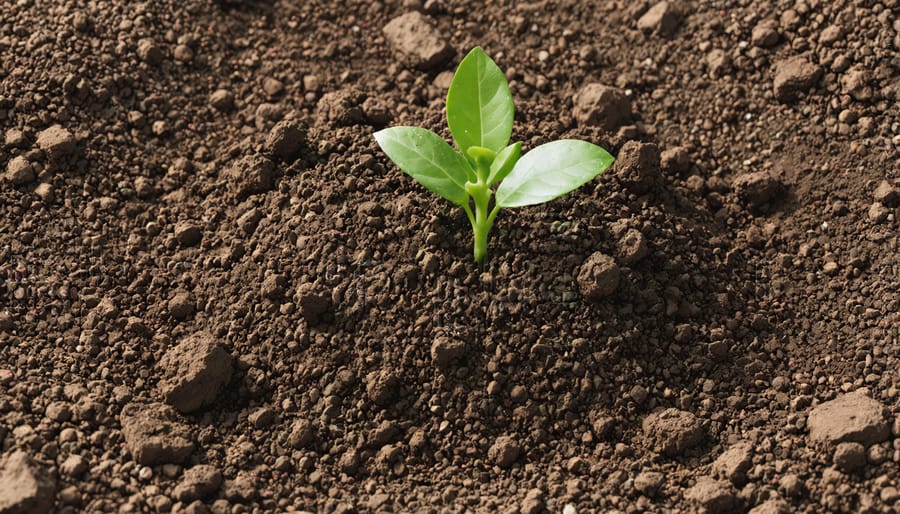
Soil Health Management Education
In Alberta’s agricultural landscape, understanding and maintaining soil health is fundamental to sustainable farming success. Through comprehensive educational programs, farmers are gaining valuable insights into soil conservation practices that enhance both productivity and environmental stewardship.
Local agricultural extension offices offer hands-on workshops where farmers learn practical soil testing methods, interpret results, and develop tailored soil management strategies. These sessions, often led by experienced agronomists, combine classroom learning with field demonstrations, allowing participants to see real-world applications of soil health principles.
The Alberta Soil Health Initiative, launched in 2021, has been particularly successful in connecting farmers with soil experts through regional study groups. These groups meet monthly to discuss challenges, share successes, and learn about innovative techniques like cover cropping and reduced tillage systems.
Digital learning platforms have also emerged as valuable resources, offering flexible access to soil management education. The Canadian Soil Network’s online courses allow farmers to study at their own pace while connecting with peers across the province through virtual discussion forums.
Real-world success stories demonstrate the impact of this education. Take Dave Henderson from Red Deer County, who applied his soil management training to transform depleted fields into productive land within three growing seasons, achieving a 30% increase in organic matter content while reducing input costs.
Carbon Reduction Strategies
Alberta farmers are increasingly adopting innovative carbon reduction strategies that benefit both the environment and their bottom line. Through educational workshops and hands-on training sessions, farmers are learning effective methods to decrease their carbon footprint while maintaining or improving crop yields.
Key practices include precision agriculture techniques, which use GPS technology and soil mapping to optimize fertilizer application, reducing both costs and emissions. Many farmers have successfully implemented no-till farming methods, which help sequester carbon in the soil while improving soil health. For example, the Thompson family farm near Red Deer reported a 30% reduction in fuel consumption after switching to no-till practices.
Cover cropping has emerged as another powerful tool in the carbon reduction toolkit. Local agricultural extension offices offer seasonal workshops demonstrating how to select and manage cover crops effectively. These plants help capture carbon dioxide from the atmosphere while protecting soil from erosion during off-seasons.
Regional success stories include the adoption of renewable energy solutions, with solar panels becoming increasingly common on Alberta farms. The Alberta Agricultural Carbon Offset System provides additional incentives for farmers implementing carbon reduction strategies, offering credits for verified emissions reductions.
Farmers can access free carbon calculators through local agricultural offices to measure their baseline emissions and track improvements. Regular community forums allow farmers to share experiences and best practices, creating a supportive network for sustainable agriculture initiatives.
Success Stories: Alberta’s Educational Innovation
Local Farmer Testimonials
Sarah Thompson, a third-generation farmer from Lethbridge, credits agricultural education programs for transforming her 400-hectare operation. “The sustainable farming workshops helped me increase yields by 30% while reducing water usage,” she shares. “I’m now teaching these techniques to my children, ensuring our farm’s future.”
In Red Deer, Mark Anderson implemented precision agriculture techniques learned through local extension programs. “Understanding soil health and data-driven decision-making revolutionized our approach,” he explains. “Our farm’s profitability has improved significantly, and we’re better stewards of the land.”
Emma Rodriguez, who runs a family farm near Medicine Hat, participated in a mentorship program connecting experienced farmers with newcomers. “The knowledge exchange was invaluable,” she says. “Learning from those who’ve faced similar challenges helped us avoid costly mistakes and adopt proven solutions.”
For James White, whose organic farm outside Calgary has become a model of sustainability, education was key to success. “The certification courses and workshops gave me confidence to transition to organic farming,” he reflects. “Now, we’re not just surviving; we’re thriving and inspiring others in our community to embrace sustainable practices.”
Community Learning Initiatives
Throughout Alberta, community-based learning initiatives have transformed how farmers access and share agricultural knowledge. The Foothills Agricultural Network’s peer-to-peer mentorship program pairs experienced farmers with newcomers, fostering valuable knowledge exchange and building lasting relationships within the farming community.
Hands-on farming workshops hosted by local agricultural societies have proven particularly successful, with participants reporting a 40% increase in sustainable practice adoption rates. The Red Deer County’s Sustainable Agriculture Program, for example, brings together over 200 farmers annually for practical demonstrations of soil conservation techniques and crop rotation strategies.
The Southern Alberta Agricultural Learning Circle has pioneered a unique mobile classroom approach, bringing expert instruction directly to rural communities. Their “Farm-to-Field” program combines traditional classroom learning with on-site demonstrations, making education more accessible to remote farming communities.
Digital learning communities have also gained traction, with the Alberta Farm Knowledge Network connecting over 3,000 farmers through online forums and virtual study groups. These platforms enable real-time problem-solving and experience sharing, particularly valuable during challenging growing seasons or when testing new agricultural methods.
Future of Agricultural Education
Technology Integration
Modern farming has embraced digital transformation, with innovative technologies reshaping how agricultural knowledge is shared and acquired. Alberta farmers are increasingly turning to agricultural learning applications that provide real-time insights and decision-making support. These digital tools include weather monitoring systems, soil analysis apps, and crop management platforms that integrate seamlessly with daily farming operations.
Virtual reality simulations now allow farmers to practice new techniques safely before implementing them in the field, while drone technology provides hands-on training for precision agriculture. Mobile learning platforms have made education accessible even in remote areas, enabling farmers to access expert guidance and training materials on demand.
Interactive online forums and digital mentorship programs connect experienced farmers with those seeking to expand their knowledge, creating a collaborative learning environment that bridges geographical distances. These technological advances have transformed traditional agricultural education into a more dynamic, accessible, and practical experience for Canadian farmers.
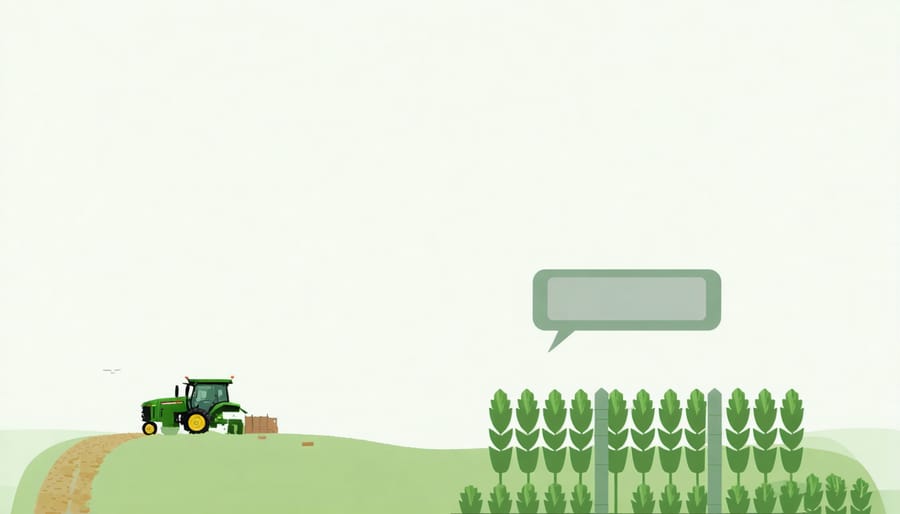
Collaborative Learning Models
The future of agricultural education in Alberta lies in the power of community-based learning networks. Farmer-to-farmer mentorship programs are gaining momentum, with experienced producers sharing sustainable practices and innovative solutions with newer generations. These collaborative models often take shape through regular meetups, field demonstrations, and online forums where farmers can exchange knowledge year-round.
Local agricultural societies are evolving to facilitate these peer learning opportunities, organizing workshops and study groups focused on specific challenges like soil health management and water conservation. The Southern Alberta Farm Innovation Network exemplifies this approach, connecting over 200 farmers who share experiences and trial results through monthly gatherings and digital platforms.
Looking ahead, hybrid learning models combining in-person and virtual collaboration are becoming increasingly popular. These formats allow farmers to maintain strong local connections while accessing expertise from across the country. Community-driven initiatives, such as the Red Deer Agricultural Learning Circle, demonstrate how shared knowledge can lead to improved farming practices and stronger rural communities.
As we’ve explored throughout this article, continuous education stands as a cornerstone of modern farming success in Alberta and across Canada. The relationship between knowledge and empowerment is clear: farmers who engage in ongoing learning are better equipped to face industry challenges, adopt sustainable practices, and build resilient agricultural businesses.
The impact of educational initiatives extends far beyond individual farms. When farmers have access to quality learning resources and support networks, entire communities benefit from improved food security, environmental stewardship, and economic stability. The success stories we’ve shared from across Alberta demonstrate how education transforms traditional farming operations into innovative, sustainable enterprises.
Looking ahead, the commitment to farmer education must remain strong. As agriculture continues to evolve with new technologies and changing climate patterns, the need for accessible, practical learning opportunities becomes even more crucial. By supporting educational programs, mentorship initiatives, and knowledge-sharing platforms, we invest not just in individual farmers but in the future of Canadian agriculture.
Remember, empowerment through education is an ongoing journey. Every new skill learned, every practice improved, and every connection made contributes to a stronger, more sustainable farming community. Together, we can ensure that Canadian farmers continue to lead the way in innovative and responsible agriculture.


